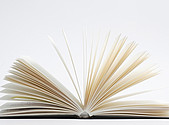In the Science Year 2020|21 - Bioeconomy, the exhibition ship MS Wissenschaft is touring Germany on behalf of the Federal Ministry of Education and Research. On board the MS Wissenschaft, you will gain insights into the bioeconomy, the sustainable form of economic activity that relies on renewable resources. Microorganisms and raw material cycles, new active ingredients from nature, food of the future, and political and social questions that arise on the way to a bio-based economy. Various exhibits from science and research invite you to discover, try things out, and participate.
On board the MS Wissenschaft is the exhibit “New Products from Bio-Waste" from the Department of Conversion Technologies of Biobased Resources at the University of Hohenheim. It deals with the question "How can products be manufactured from renewable raw materials without competing with food cultivation?” We can now make many products from plants instead of from oil or coal. But when we produce clothing, food storage containers, computer cases, furniture parts, medicines, and materials for batteries with biological substances, a new problem arises. Areas on which these are cultivated are no longer available for our food. But there is a way out: We can use the non-edible byproducts of the food. And the more food is produced, the more of this bio-waste is available. As long as we use the resulting products, they store carbon. If these are burned in the end, they only release as much carbon dioxide (CO2) as the plants have absorbed before to grow - they are therefore CO2-neutral.
The ship tour starts in Münster on 30 July. From there, the ship first heads for the Ruhr area and via the Rhine and Main to Franconia, then via the Danube to Straubing. This year's tour ends there on 17 October. In total, MS Wissenschaft will visit 19 cities.
Information and up-to-date news on dates: https://ms-wissenschaft.de/
Opening event and start of the exhibition on 30 July 2020
| Exhibition | 30 July - 17 October 2020 | 10 a.m. - 1:30 p.m. and 2:30 - 7 p.m. | |
| Public event | Free admission | No registration | Limited number of participants | handicapped accessible | Tour plan | |
The exhibition is closed daily from 1:30 - 2:30 p.m. for thorough cleaning. Contact person for the exhibit at the University of Hohenheim: Prof. Dr. Andrea Kruse, Department of Conversion Technologies of Biobased Resources |
 Having your own biorefinery on your doorstep could become reality on the farm of tomorrow: Facilities in which plant biomass is used to produce chemicals, animal feed, or bioenergy, for example. Markus Götz from the Department of Conversion Technologies of Biobased Resources at the University of Hohenheim uses the example of the Hohenheim Biorefinery Technology Center to explain how this works without competing with food production.
Having your own biorefinery on your doorstep could become reality on the farm of tomorrow: Facilities in which plant biomass is used to produce chemicals, animal feed, or bioenergy, for example. Markus Götz from the Department of Conversion Technologies of Biobased Resources at the University of Hohenheim uses the example of the Hohenheim Biorefinery Technology Center to explain how this works without competing with food production.
Length: approx. 13 minutes | Click here to listen!
Podcast | Tuesday, 4 August 2020 | |
 In this episode of the podcast, Prof. Dr. Andrea Kruse provides insights into the "B4B - Biorefinery for the Bioeconomy in Baden-Württemberg" project. The expert explains that although a sustainable product has to survive on the market on its own, the establishment of biorefineries requires the support of politicians in order to overcome financial obstacles. This is because there is interest along the entire value creation chain, from farmers to distributors. The University of Hohenheim is working on the improvement of these plants, amongst other things with the "B4B" project, and with its unique cross-faculty profile in research and education, is training the experts for sustainable projects of tomorrow.
In this episode of the podcast, Prof. Dr. Andrea Kruse provides insights into the "B4B - Biorefinery for the Bioeconomy in Baden-Württemberg" project. The expert explains that although a sustainable product has to survive on the market on its own, the establishment of biorefineries requires the support of politicians in order to overcome financial obstacles. This is because there is interest along the entire value creation chain, from farmers to distributors. The University of Hohenheim is working on the improvement of these plants, amongst other things with the "B4B" project, and with its unique cross-faculty profile in research and education, is training the experts for sustainable projects of tomorrow.
Length: approx. 20 minutes | Click here to listen!
Podcast | Tuesday, 18 August 2020 | |

Read - or have it read aloud: For the Stuttgart-based author Philipp Schönthaler, the Science Year is an occasion to approach the topic of the "bioeconomy" in a literary way - through short prose, poetry, or aphorisms. The first article on the monthly focus "Mobility" is available for reading or listening. In an interview with the Online Courier, the author reveals how he approaches the scientific topics.
Length: approx. 24 minutes
Literature | Monday, 31 August 2020 | |
| Interview with the author in the Hohenheim Online-Courier |




